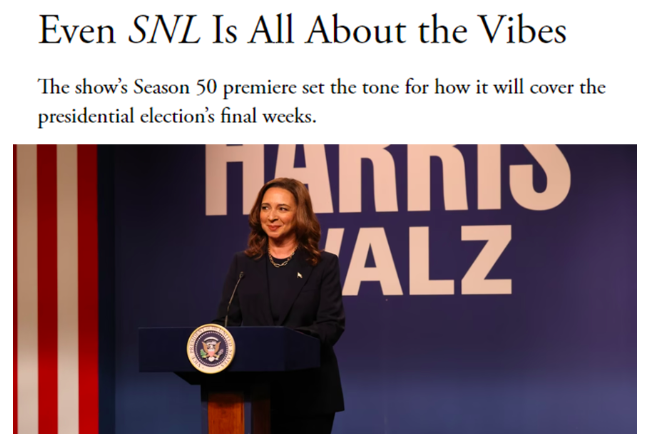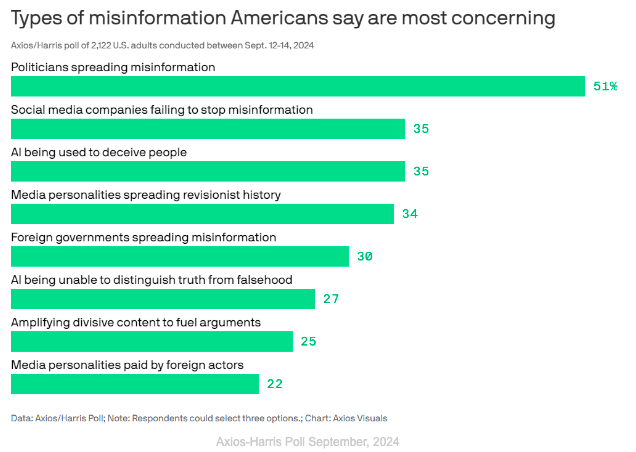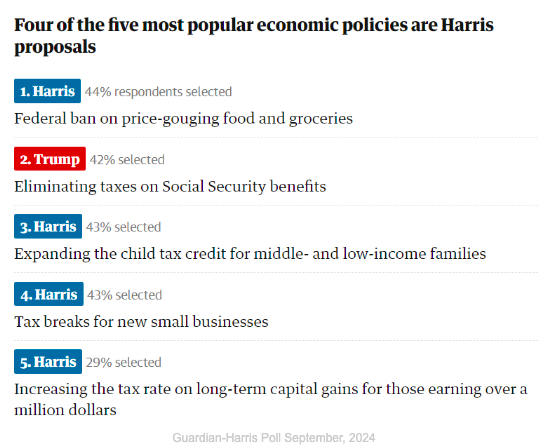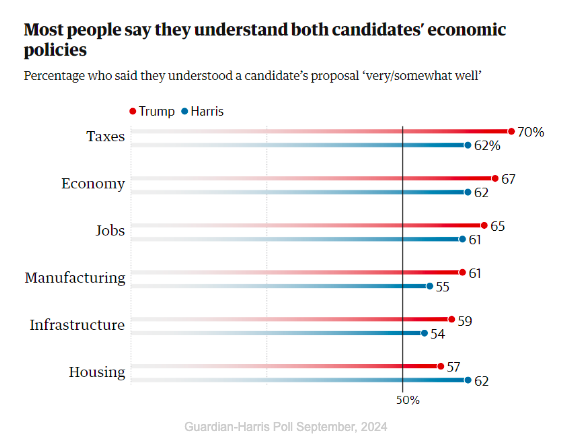Brief • 5 min Read
Misinformation Vibes, Blind Testing The Candidate’s Policies, Swiping Right On Politics, and Ongoing Supply Chain Nightmares
The latest trends in society and culture from The Harris Poll
Good afternoon from New York.
In SNL’s cold open for its 50th season, Maya Rudolph deemed her campaign like the Sabrina Carpenter song Espresso: “The lyrics are vague, but the vibe slaps.” In America This Week, conducted September 27th to 29th, 2,445 Americans (87%) said that in dealing with today’s times, they intentionally seek out good vibes in their lives. Speaking of which, our Axios-Harris Poll Monthly Vibes launched in January.

This week, we have four new stories:
- Axios and Harris Poll: Americans think more misinformation comes from U.S. politicians than Russian bots.
- With The Guardian, Americans blind test the economic policies of Trump and Harris.
- And with Axios, have you ever lied about your political beliefs on a date? (You’re not alone).
- Supply chains are causing more than just headaches in a new executive study with Prologis.
Americans Blame Politicians For Misinformation: Axios Vibes By The Harris Poll
In our new Axios Vibes/Harris Poll survey, when asked to identify up to three top concerns about misinformation, more than half (51%) said politicians spreading misinformation to control their supporters ahead of social media regulation and AI deception.

- Fake news can have real consequences: (70%) of respondents said they expect misinformation will have a lot or quite a bit of impact on the presidential election, and (57%) felt it would impact local election results.
- Between the lines: Republicans are much more likely than Democrats to dismiss information that conflicts with their own views if it comes from a source they don’t know.
- The big picture: Over half (54%) said, “I’ve disengaged from politics because I can’t tell what’s true.”
- Half of voters polled – and nearly two-thirds of non-voters – said it’s becoming too difficult for them to tell what is true and what is false regarding political news and the media. This is especially true for independents (58%) and Republicans (55%) compared with Democrats (39%).
Takeaway: We told Axios, “Like the old horror movie, the call is coming from inside the house.” In past elections, there was always a fear of misinformation and election interference coming from abroad. But here, we see the most likely source of concern is America’s own politicians spreading misinformation. It used to be that we were worried about China or Russia, fake ads or Facebook. Now, no, it’s coming from the campaigns.
Americans Blind Test The Candidates’ Economic Policies: The Guardian-Harris Poll
Since so much of politics is divided today, we wondered how Americans might rate policies without the Red or Blue label attached. According to our latest poll with The Guardian, Harris’ economic policies are seemingly more popular than Trump’s:

- Harris’ price gouging proposal would potentially address Americans’ top economic concern around the cost of living (66%).
- Though she has been criticized for being “light on policy,” a majority of voters in the poll suggested they understand Harris’ policies just fine in similar numbers to Trump:

- What about Biden? Democratic voters seem to think Harris turned out to be the better candidate, with (80%) believing their lives would be better if Harris won the election instead of Biden.
- Millennials may be Harris fans: The majority of millennials (59%) said that Harris’s policies are better than Biden’s, compared to just (36%) of Boomers.
Takeaway: Despite some skepticism that VP Harris has yet to define her position, our data shows she’s energized her base – particularly millennials, who will be the largest voting bloc this election – by effectively messaging and connecting with them on the issues they are facing as they move more into adulthood: childcare, housing, and jobs.
Swiping Right On Politics: Axios-Harris Poll
We found that ideological differences among young people are coming up on first dates and often complicating them in our latest research, featured in Axios.
- Why it matters: The intersection of politics and dating has become increasingly more prominent as one in four will start with politics on the first date, said our CSO Libby Rodney at an Axios event sponsored by Match Group and Tinder.
- By the numbers: A quarter (24%) of Gen Z say they’ve been asked about political beliefs on the first date, and a quarter (16%) admit to lying about their beliefs.
- Politics are the latest dealbreaker: Nearly three in ten (28%) Gen Z and Millennials have broken up with someone over political beliefs.
- Swiping on political ideology: Only (56%) of Republicans would date a Democrat, and only (43%) of Democrats would date a Republican.
Takeaway: “What [women are] doing instead is asking proximity questions like, ‘How do you feel about Covid? What’s your point of view on Travis Kelce?’ And depending on how you respond to those, they can indicate where your real beliefs are on that spectrum,” said Rodney. She noted that half of women would rather be single than settle for someone with opposing political beliefs. “The single lady movement is real, and people are here for it.”
More Sleepless Nights Over Supply Chains: Prologis-Harris Poll
It was supposed to be fixed after COVID. But in our inaugural research with Prologis, we find a looming poly-crisis above business leaders from the U.S., U.K., and Germany, where economic instability, fluctuating customer demands, and pressing climate challenges converge.
- Supply chains are being tested on multiple fronts: Two-thirds of executives surveyed (66%) indicated they lose sleep about supply chain issues, highlighting the significant stress these conditions create.
- Here or there? (86%) of executives agree that “Rising economic and geo-political pressures are driving decisions on where to manufacture and store goods.”
- Preparing for the unexpected: As natural disasters, regulatory shifts, and unexpected political events loom, executives acknowledge preparing for these unforeseen “black swan” events is a top priority (87%).
- Yet, less than half feel adequately prepared for challenges like cybersecurity attacks (42%), technological disruptions (41%), regulatory changes (40%), and labor market fluctuations (39%), with even fewer ready for trade wars (36%) or global pandemics (34%).
Takeaway: “Supply chain capabilities are crucial for business success, and the ability to anticipate and swiftly adapt to rapid changes is key to thriving,” said Hamid R. Moghadam, co-founder and CEO of Prologis. “In today’s complex and interconnected world, disruptions create ripple effects that can reshape industries and have lasting consequences on global operations.”
Subscribe for more Insights
Subscribe to our newsletter for the latest trends in business, politics, culture, and more.
Download the Data
This survey was conducted online within the U.S. by The Harris Poll from September 27th to 29th, among a nationally representative sample of 2,445U.S. adults.
Download
Subscribe for more Insights
Subscribe to our newsletter for the latest trends in business, politics, culture, and more.
Download the Data
This survey was conducted online within the U.S. by The Harris Poll from September 27th to 29th, among a nationally representative sample of 2,445U.S. adults.
DownloadRelated Content







